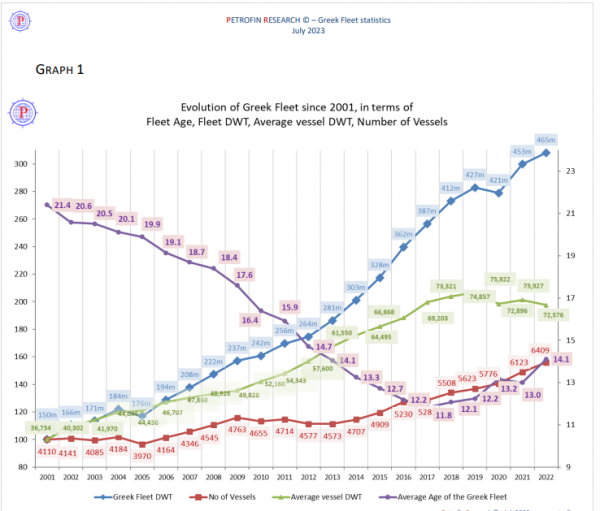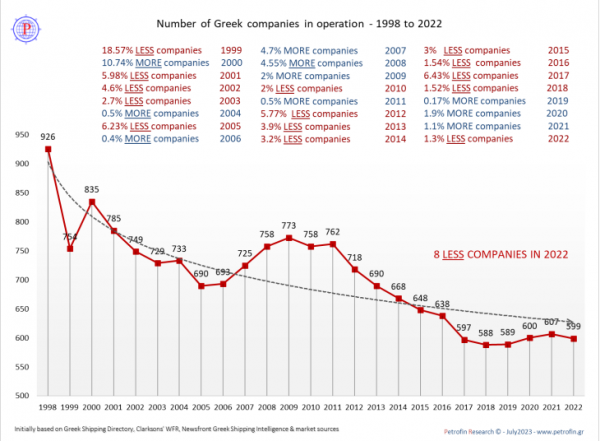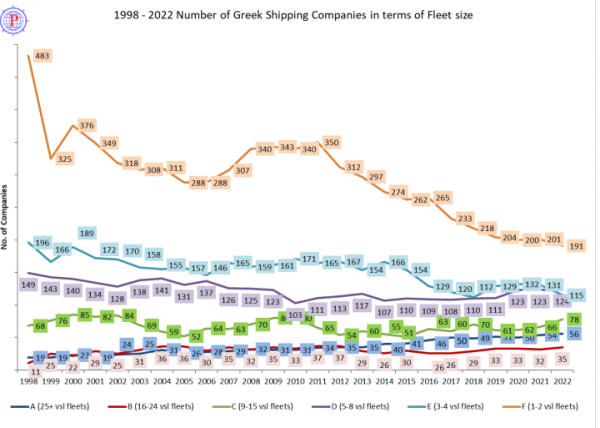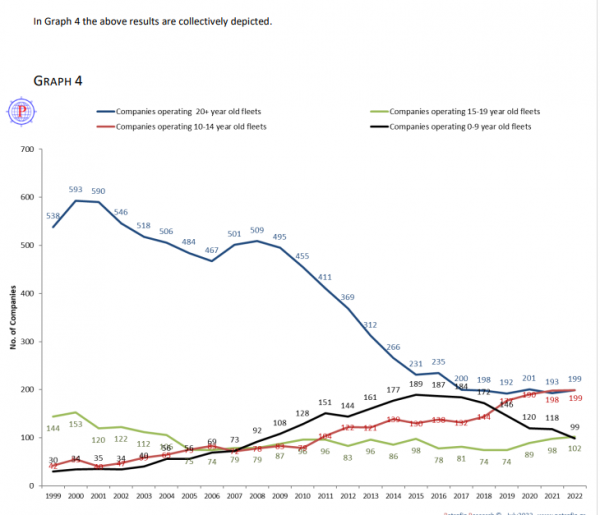Greek Shipping: Fleet increased, number of shipping companies decreased
- Written by E.Tsiliopoulos
The Greek-owned fleet increased in ships and capacity, while the number of shipping companies decreased slightly, according to the Petrofin Research report released a while ago. In particular, as noted, all vessel types and sizes increased by 2.8%, with their number reaching 6,409 vessels at the end of 2022 from 6,123 in 2021. Consequently, the average size of the Greek-owned fleet decreased to 72.5 thousand tons DWT.

The age has also increased to 14.1 years, which we have seen since 2014. Greek shipowners have shown a preference for used tonnage, as newbuild decisions are not easily made in the face of yet-to-be-decided new technologies that will drive the fleet to zero emissions by 2050.
There is also a relatively small increase in the capacity of the Greek fleet by 3%. In absolute numbers, the fleet increased by 286 units of all types and sizes. This results in a reduction in average ship size and an increase in the age of the fleet by just over a year.
The number of Greek companies fell to 599, reversing the slow growth of the past three years. In 2021 there were 607 Greek companies from a low of 588 in 2018, but down from the all-time high of 1998. The trend towards company consolidations continues.

In terms of company size, the number of companies with 25+ vessels continued to increase to 56 in 2022, up from 54 in 2021, marking the highest number ever recorded. In terms of tonnage they are up by 18.17 million DWT from 2021.

Owners of ships over 1 million tons are down by 4 to 78, compared to 82 in 2021, 80 in 2020, 81 in 2019. Their share of the fleet is also down slightly to 78.3% compared to 79% in 2021. The 80% share of million tons is still a significant hurdle.
The number of companies operating very young fleets (0-9 years old) continues its downward trend, falling below 100 to 99, returning to 2008-2009 levels. This reflects the skepticism behind ordering newbuilds resulting in an increase in the average age of the fleet.
The age increase that started in 2018 continues. The total age of the entire Greek fleet in 2022 was 14.1, compared to 13 in 2021 and 13.2 in 2020.

Also according to Petrofin, there is a big drop in the number of smaller companies (with 1-2 ships) which are below 200 for the first time and were formed at 191 in 2022. Also, a significant decrease is seen in companies with 3-4 ships, which are reduced to 115 in 2022 from 131 in 2021.
Companies with a fleet of 9-15 ships jumped to 78 in 2022 from 66 in 2021, while the number of companies with 16-24 ships as well as the number of companies with 5-8 ships is stable.
Companies with a fleet of 25+ vessels continued their rise in 2022 to 56 from 54 in 2021. Again, the highest number since 1998
Related items
-
 Deputy FM Kotsiras: Bringing young college students and researchers of the diaspora closer to Greece
Deputy FM Kotsiras: Bringing young college students and researchers of the diaspora closer to Greece
-
 Visa express now available on five more Greek islands for Turkish citizens
Visa express now available on five more Greek islands for Turkish citizens
-
 BoG: Over 30 mln tourists in Greece in 2023; receipts up 16.5% compared to 2022
BoG: Over 30 mln tourists in Greece in 2023; receipts up 16.5% compared to 2022
-
 Plato: The papyri that "showed" his burial place also revealed how he spent his last hours!
Plato: The papyri that "showed" his burial place also revealed how he spent his last hours!
-
 More than 200,000 registered for postal vote before Monday deadline
More than 200,000 registered for postal vote before Monday deadline
Latest from E.Tsiliopoulos
- Deputy FM Kotsiras: Bringing young college students and researchers of the diaspora closer to Greece
- Visa express now available on five more Greek islands for Turkish citizens
- BoG: Over 30 mln tourists in Greece in 2023; receipts up 16.5% compared to 2022
- Plato: The papyri that "showed" his burial place also revealed how he spent his last hours!
- More than 200,000 registered for postal vote before Monday deadline

